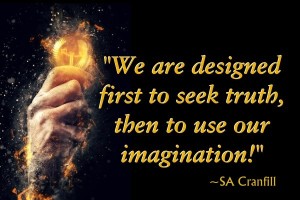
It is imperative that we keep our history ~ all of it, good and bad ~ alive and well. It’s how and why we got here. It’s who we are. Our future depends on knowing and understanding our past.
In order for a society’s values to continue, they must be conveyed to succeeding generations. ~ R. Gordon Kelly quoted by Dr. Deidre Johnson in Edward Stratemeyer and the Stratemeyer Syndicate
After gathering as many facts ~ as much truth ~ as reasonably possible, it’s appropriate to apply imagination to bring that history to life. Historical fiction is a wonderful way to do that. And it’s thrilling to read those exceptional historians who know just how and when to apply their own learned imaginations to scholarly works of history.
My husband and daughter would tell you that I am like the Number 5 robot who came to life in the 1986 movie Short Circuit. “Input! Input! Input!” My curiosity seems to know few bounds, though it skews heavily toward the American journey, American cultural history, and the “Working Will” Shakespeare. As a playwright, producer, and director, I’m fascinated by the daily demands and challenges of The Great Bard’s career as well as by his views on history and culture. The vitality of his influence on 400-plus years of education and entertainment in England, America, and globally is stronger than ever. I think Will and his fellow actors would be amazed.
Recently, I’ve become interested in the juvenile series books of the first half of the 1900s. Why? It’s far more than nostalgia. Dating from the 50s and 60s back to the late 1800s, these marvelous stories of fiction, historical fiction, and “current-events-history” fiction are valuable and entertaining time capsules for young readers as well as cultural history buffs. I’ve gone in search of yesterday’s heroes and discovered a treasure trove of inspiration for today’s boys (and girls). I hope to inspire parents and teachers to explore the same path.
![]()
 Growing up, I walked around with a book in my hand. “Just one more chapter! Just one more page!” I thoroughly grazed the school library. I read everything in the house. Books were open doors to other places, times, and people. Unlimited adventure. I could never understand anyone who didn’t like to read. When I was young, we couldn’t afford horses, but I could read every horse story in reach, until I got old enough, and employed enough, to own and show one.
Growing up, I walked around with a book in my hand. “Just one more chapter! Just one more page!” I thoroughly grazed the school library. I read everything in the house. Books were open doors to other places, times, and people. Unlimited adventure. I could never understand anyone who didn’t like to read. When I was young, we couldn’t afford horses, but I could read every horse story in reach, until I got old enough, and employed enough, to own and show one.
In college, I took some courses in Shakespeare, and then stopped just shy of a masters in history. My writing career includes advertising, professional and industry publications, political research, and state histories. Those were the paid gigs. I’ve also penned a number of musical comedies for youth in homeschool cooperatives and community theater ~ a vigorous exercise for the imagination and a lot of practice in writing dialog.
 Writing is sharing. Input demands outlets for output. Teaching, like writing, is sharing something that’s interesting, exciting, beneficial, worthy of attention and discussion. It’s all hard work, but it’s all fun.
Writing is sharing. Input demands outlets for output. Teaching, like writing, is sharing something that’s interesting, exciting, beneficial, worthy of attention and discussion. It’s all hard work, but it’s all fun.
